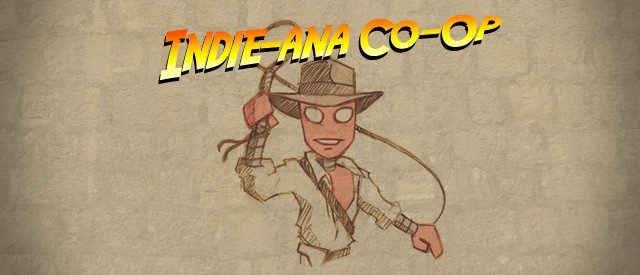A boy and a girl sit in front of a glowing screen, their faces awash in hollow blue light. The boy’s right hand fingers tremble over the arrow keys of a keyboard; he bites the nails of his left. The girl’s painted nails tap on the A and W keys. Suddenly the boy shouts, “No not there!!” and the girl startles, hands now high in the air, before she retorts, “Yes huh! That’s totally right!” He yells back “No way!” and juts his finger at the screen, pointing, only to have it slapped away, and the two row for a moment. On screen a pair of characters die horribly, first burned alive and then devoured by piranhas, again and again, all the while their godlike puppeteers screaming back and forth: “That’s not where it goes!” “Yes it is!!” “Now I’m dead again!” “Well that’s your own fault!” “Come stand over here!” “Here?” “No, here!!” “THAT WON’T WORK!” “YES IT WILL!!!” Until suddenly the girl is calm. You’d swear you can actually see the light bulb that illuminates over her head as her expression changes. “Wait... wait wait wait...” As her character pushes a box, the boy’s follows suit, jumping into position - he instantly knows what she wants him to do. A few precise movements later, and a victorious chime echoes through the room, their characters now dancing on screen. “YES!!!” the two shout in unison, and suddenly they’re in an embrace, sharing a kiss.
Their first kiss.
Okay, that ending may be a wee bit of an exaggeration, but the rest is a (mostly) real account of people playing the first major release of A Jolly Corpse, Wyv and Keep! Wyv and Keep is a 2D platformer that relies on solving wooden crate-based puzzles, avoiding deadly traps, and running from cannibalistic pygmies. Just like real life! You’ll even delve deep into a volcano... And most of all, you’ll rely on cooperative play between Wyv and Keep. In most cases, a box must be pushed atop a switch in order to open the door to the next level, and there are multitudinous obstacles waiting to fail or kill the players. A single player can take control of both characters, either by switching back and forth between them, or for more experienced gamers, even by controlling both at once. But every level requires the characters to work together to advance, so the gameplay really comes to life when the characters are being controlled by separate people. Especially by a pair of close friends or lovers. Or mortal enemies! Boxes and switches in the Amazonian jungle, you ask? Yup!
A live play session of Wyv and Keep. It's all cooperative fun... until the arguments break out :)
As we’ve developed Wyv and Keep, we’ve gotten to see quite a few sets of playtesters experiencing co-op puzzle-solving first-hand. When we get to see different types of personalities come out there are often heartwarming and always hilarious results, and this is when we really feel rewarded as game developers. Sometimes in a couple we can easily see who wears the pants in the relationship, as one will quickly proceed to start giving orders to the other (whether those orders be correct or not). Their partner will often even do the actual puzzle solving, meekly suggesting ideas that are actually correct. Other pairs seem to take on the personalities of the characters themselves, with those playing Wyv rushing headfirst into adventure, and those playing Keep sitting back and making sarcastic quips as the other dies horribly.
Two evenly matched friends tend to be the funniest to watch as players quickly walk astray of the teamwork path and vie for top position, working together only just as much as necessary before battling each other to be the MVP of any particular puzzle, and especially for the apparently much coveted position of one-who-activated-the-switch. We’ve seen some disagreements become volatile during especially difficult levels, but one thing that’s shared across all personality types is that when the level is finally solved, all is forgiven in laughter and hugs. There’s probably even some viable material here for people studying interpersonal communication and relationships! But we’ll leave that to them. We just want to make games.
